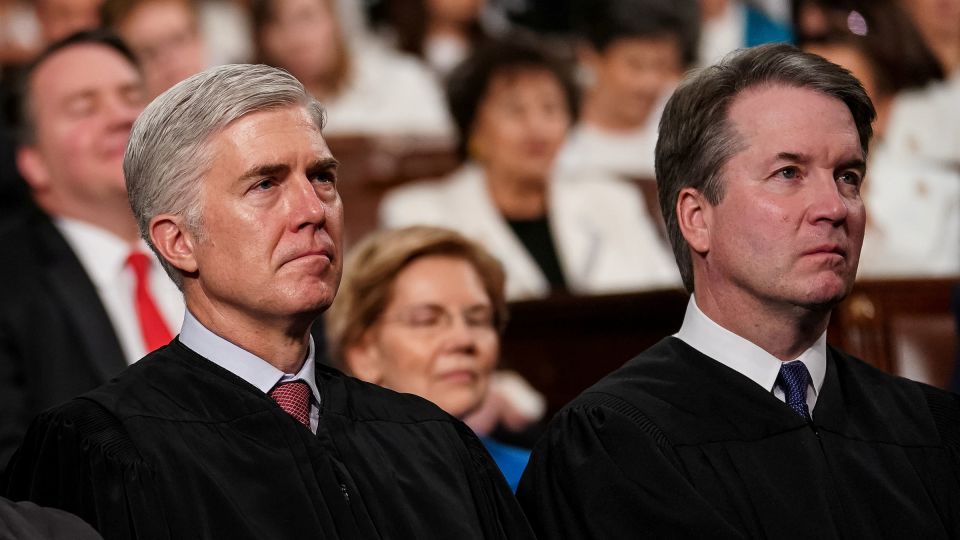Gorsuch and Kavanaugh Caution Lower Court Judges in Trump Cases

The Supreme Court's Role in Trump's Legal Battles
Donald Trump has long been at odds with federal judges, but his recent legal challenges have found an unexpected ally: the Supreme Court. A growing frustration with lower courts has begun to surface in the opinions of the court’s conservative justices as they handle a surge of emergency cases related to Trump's second term.
Justice Neil Gorsuch recently issued a strong warning to lower court judges, stating that they are not free to defy the Supreme Court's decisions. This opinion, which was joined by Justice Brett Kavanaugh, shifted the narrative from one where Trump is seen as pushing legal boundaries to one where it is the lower courts that are failing to respect the precedents set by the high court.
Gorsuch emphasized that when the Supreme Court issues a decision, it becomes a precedent that must be respected by lower courts. This sentiment was echoed by other conservatives, including Justice Samuel Alito, who criticized a federal judge for what he called "judicial hubris" in a case involving a Trump policy.
The Supreme Court has consistently ruled in favor of Trump on the emergency docket, including cases related to immigration, spending, and independent agencies. According to Steve Vladeck, a Supreme Court analyst, the justices seem more concerned with how lower courts interpret their rulings than with whether the executive branch behaves properly before the judiciary.
In a dissenting opinion, Justice Ketanji Brown Jackson described the court's approach as "Calvinball jurisprudence," referencing the comic strip "Calvin and Hobbes." She argued that the court's decisions lack clear rules, suggesting that the administration always wins.
Trump's public criticism of federal courts has decreased since the spring, but many of his allies continue to blame the judiciary for losses in court, often attributing them to political bias. Former personal lawyer Alina Habba recently stated that the administration will not fall to "rogue judges."
Critics argue that Trump is responsible for the tension between the executive and judicial branches, not only because of his rhetoric but also due to the Justice Department's handling of high-profile cases. Justice Sonia Sotomayor accused the court of "rewarding lawlessness" in one case, warning that such actions erode respect for the rule of law.
Gorsuch's strong stance suggests that some justices believe lower courts are overreacting to the administration's moves. James Burnham, a former Gorsuch clerk, noted that the defiance of Supreme Court emergency orders by some lower courts is unprecedented and requires decisive action.
Carrie Severino of the Judicial Crisis Network praised Gorsuch's opinion, emphasizing the need for district judges to follow the Supreme Court's orders. However, the interpretation of these emergency orders remains a topic of debate, especially when they are vague or lack explanation.
Early in Joe Biden's presidency, Alito stressed that the Supreme Court's emergency orders do not set precedent. Unlike regular cases, emergency orders are decided without oral arguments or extensive briefings and do not resolve the underlying legal questions.
Vladeck pointed out that while a majority opinion with clear language is easier to understand, the lack of analysis in some emergency orders can lead to confusion. He argued that if the court wants lower courts to treat its analyses as precedent, it should provide clearer reasoning.
Recent decisions have reinforced the idea that short-term orders should control similar cases. In a 5-4 decision, the court ruled that a district judge erred in requiring the administration to revive nearly $800 million in NIH research grants. The unsigned opinion cited an earlier order from April that allowed officials to block grants to states addressing teacher shortages.
The Supreme Court has also stripped the power of lower court judges to issue nationwide injunctions used to shutdown policies from both parties. This ruling came in a challenge to Trump's executive order on birthright citizenship.
Lower courts continue to explore other ways to temporarily halt policies they believe are unconstitutional. Justice Kavanaugh recently emphasized that judges are not policymakers, reinforcing the importance of their role in maintaining judicial independence.
During the court's summer break, some justices have spoken about the need for better explanations in their emergency orders. Justice Elena Kagan suggested the court could do more to clarify its decisions, while Kavanaugh defended the court's sometimes terse approach.
Kavanaugh highlighted the importance of an independent judiciary and the responsibility of judges to get things right. His remarks, while not specific to any case, serve as a reminder to lower courts of their role in the constitutional democracy.